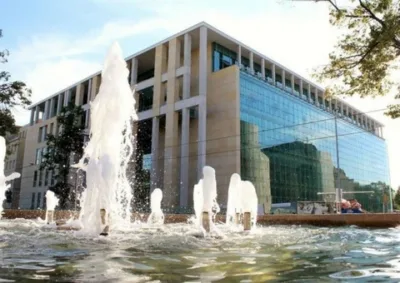The idea of social responsibility of a university (SOU) is understood as voluntarily accepted commitments to internal and external stakeholders. These commitments follow the respect of internationally disseminated norms and rules of social responsibility of organizations, in particular, the Ten Principles of the United Nation Global Compact, the Principles of Responsible Management Education (PRME) and the ISO 26000 standard. According to the ISO 26000 standard, the idea of social responsibility is applied to all types of organizations and is understood as responsibility for the impact that the activities carried out within its framework have on the external environment.
Through transparent and ethical activities, a socially responsible organization:
- contributes to sustainable development, including the health and well-being of society;
- takes into account the expectations of stakeholders (individuals or groups who have an interest in the organization’s decisions or actions);
Socially responsible activities comply with applicable laws and are consistent with international standards of conduct and integrated with the organization’s strategic goals. Adoption of the university’s social responsibility program is a response to public expectations of positive in its effects to carry out the mission ascribed to universities – public service
The Declaration of Social Responsibility of PUEB universities addresses the following assumptions:
- the SOU program is a voluntary commitment of the university to internal and external stakeholders;
- implementation of SOU requirements should be closely linked to research, educational, organizational and administrative activities undertaken at all levels of administrative units;
- social obligations are primarily the responsibility of the rectorial and dean’s authorities, but also apply to all members of the university community.
The premise of the SOU program implemented at Poznań University of Economics and Business is to undertake and support activities aimed at realizing the traditional mission of the university referring to the academic ethos. At the same time, the program should not be treated as a top-down imposed obligation – the subjective treatment of members of the university community and the principle of the voluntariness of the commitments assumed requires that actions be taken to change the awareness of the academic community in understanding the idea of social responsibility and the formation of an attitude of social commitment. The goal of these activities is therefore to assimilate the values of responsibility, authentic commitment and consolidation around common goals.


















Within the Team for Sustainable Development and Corporate Social Responsibility – a subsidiary body of the Minister of Funds and Regional Policy, which provides a platform for cooperation between the entire government administration and representatives of business and socio-economic partners – there is a Working Group on University Social Responsibility.
The purpose of the Working Group is to disseminate the principles of social responsibility of universities, as defined by the academic community in the Declaration of Social Responsibility of Universities.
The Declaration represents a voluntary commitment by colleges, universities to promote the idea of sustainable development and social responsibility in educational programs and management and organizational solutions of universities.
The idea of social responsibility of a university (SOU) is understood as voluntarily accepted commitments to internal and external stakeholders. These commitments follow the respect of internationally disseminated norms and rules of social responsibility of organizations, in particular, the Ten Principles of the United Nation Global Compact, the Principles of Responsible Management Education (PRME) and the ISO 26000 standard. According to the ISO 26000 standard, the idea of social responsibility is applied to all types of organizations and is understood as responsibility for the impact that the activities carried out within its framework have on the external environment.
Through transparent and ethical activities, a socially responsible organization:
Socially responsible activities comply with applicable laws and are consistent with international standards of conduct and integrated with the organization’s strategic goals. Adoption of the university’s social responsibility program is a response to public expectations of positive in its effects to carry out the mission ascribed to universities – public service
The Declaration of Social Responsibility of PUEB universities addresses the following assumptions:
The premise of the SOU program implemented at Poznań University of Economics and Business is to undertake and support activities aimed at realizing the traditional mission of the university referring to the academic ethos. At the same time, the program should not be treated as a top-down imposed obligation – the subjective treatment of members of the university community and the principle of the voluntariness of the commitments assumed requires that actions be taken to change the awareness of the academic community in understanding the idea of social responsibility and the formation of an attitude of social commitment. The goal of these activities is therefore to assimilate the values of responsibility, authentic commitment and consolidation around common goals.
Achieving the set goals requires taking action in the area of the
Together we form an academic community and are aware of our responsibility for the impact we have on our environment. Working and studying at PUEB obliges us to observe high moral standards and social principles. We want students to feel pride in being a graduate of a university where respect for ethical values in interpersonal relations is a priority. We also want employees to feel satisfaction from working in a friendly environment with an atmosphere of trust and mutual respect.
These standards indicate the values of university culture, which constitute a kind of canon of behavior of its representatives.
Good manners at PUEB mean that:
Respect is a priceless value for us. Every person deserves to be respected and treated with dignity. No one should be insulted or discriminated against in any form – written, verbal or non-verbal.
Good manners at PUEB – Students’ expectations.
PRME (Principles for Responsible Management Education) is a global forum for responsible management education. It was created at the initiative of the authorities of leading business universities and received a recommendation from the Global Compact (http://ungc.org.pl/). The program was first announced at the Global Compact Leaders’ Summit in 2007. The goal of PRME is to integrate the idea of responsible business into the content of higher education.
The Poznań University of Economics and Business joined the organization in 2012. The first report on the program’s implementation was presented in 2014.
PRME
Principle 1 – PURPOSE – We develop responsible management education to foster inclusive prosperity in a world of dynamic ecosystems.
Principle 2 – VALUES – We put organizational responsibility and accountability to society and the planet at the center of what we do.
Principle 3 – EDUCATION – We transform our educational environments by integrating responsible management concepts and practices into our curriculum and didactics.
Principle 4 – RESEARCH – We study people, organizations, institutions and the state of the world to inspire responsible management and educational practice.
Principle 5 – PARTNERSHIP – We engage people from business, government, civil society and academia to advance responsible management education and practice.
Principle 6 – PRACTICE – We embrace the principles of responsible and sustainable management in our own governance and operations.
Principle 7 – DIALOGUE – We share our successes and failures to enable us to learn and best realize our shared values and goals.
The purpose of these principles is to establish a process of continuous improvement for institutions that educate managers to create a new generation of business leaders capable of facing the full complexity of the challenges facing companies and society in the 21st century.
Download file